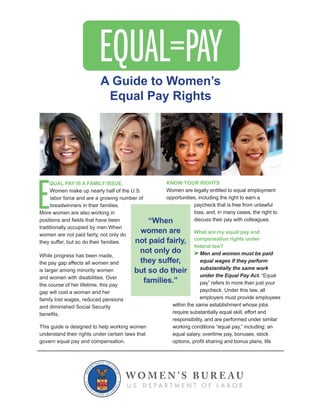Equal pay guide for women employees
- 1. E QUAL PAY IS A FAMILY ISSUE. Women make up nearly half of the U.S. labor force and are a growing number of breadwinners in their families. More women are also working in traditionally occupied by men.When women are not paid fairly, not only do they suffer, but so do their families. While progress has been made, the pay gap affects all women and is larger among minority women the course of her lifetime, this pay gap will cost a woman and her family lost wages, reduced pensions and diminished Social Security This guide is designed to help working women understand their rights under certain laws that KNOW YOUR RIGHTS opportunities, including the right to earn a paycheck that is free from unlawful bias, and, in many cases, the right to discuss their pay with colleagues. What are my equal pay and compensation rights under federal law? Men and women must be paid equal wages if they perform substantially the same work under the Equal Pay Act. payŌĆØ refers to more than just your paycheck. Under this law, all within the same establishment whose jobs responsibility, and are performed under similar ŌĆ£When women are not paid fairly, not only do they suffer, but so do their families.ŌĆØ A Guide to WomenŌĆÖs Equal Pay Rights
- 2. allowances, hotel accommodations, reimbursement for the pay differential is based on a fair seniority, merit or Your employer cannot discriminate against you on the basis of your race, color, religion, sex or national origin in any terms or conditions of your employment, including 1964, an employer with at least discrimination in the setting and paying of wages for the same or similar work. In addition to prohibiting different pay for men and women doing the same or similar job, Title VII prohibits the pay discrimination that results from unfairly denying women promotions and other forms of discrimination that can impact pay. VII are enforced by the U.S. Commission (EEOC). Many employment practices agencies that prohibit employment discrimination. Some of these than 15 employees. If you have received an unfair paycheck within charge with the EEOC. discriminatory compensation is a basis to make a claim under Title VII, regardless of when the discrimination counties and cities) after the most recent paycheck that If you work for a federal contractor, Executive Order (EO) 11246 prohibits your employer from discriminating in employment decisions, including compensation, on the basis of race, color, religion, sex or national origin. If you work for a federal contractor or subcontractor and think you are being paid less than men compensation based on your gender, you U.S. Department of Labor for guidance or assistance. Such discriminatory pay is prohibited by EO 11246. This EO applies to a federal contractor, federally-assisted construction contractor, or a federal $10,000. Most private sector employees have the right to join together, with or without a union, to improve their wages and working conditions under the National Labor Relations Act (NLRA). employer retaliation when they discuss their wages or working conditions with their colleagues as part of an effort to ŌĆ£Most private sector employees have the right to join together, with or without a union, to improve their wages and working conditions under the National Labor Relations Act.ŌĆØ
- 3. What can you do if you think youŌĆÖre experiencing compensation discrimination? 1. Try to resolve the situation informally, such as meeting with your supervisor to discuss your concern. she is unable to assist you, try contacting a human in your employee handbook to address workplace discrimination to understand your companyŌĆÖs preferred approach to complaints of discrimination. If you are a 2. Educate yourself about your rights: Opportunity Commission (EEOC). The EEOC of discrimination with the EEOC. For federal sector employment, you also can refer to your agencyŌĆÖs federal sector complaint procedures. with the EEOC. The Lilly Ledbetter Fair Pay Act of 2009 for purposes of Title VII. Under Title VII, a depending on the state, county and city) after the a charge with the EEOC. The Ledbetter Act states that there is a new discriminatory action each unequal wages. 11246. If you are concerned about employer policies that to learn more about your rights under the National 3. Ensure that you keep accurate records. If you able to relay the facts as clearly as possible. Keep copies of any documents related to the employment discrimination, such as your pay stubs, emails, disciplinary actions. Think about whether there are any witnesses to the Keep notes if necessary to help you remember key Keep copies of all of these documents in a safe place. 4. Check with your state or local agency that administers state or local anti-discrimination laws. federal law. 5. Obtain legal assistance, if necessary. attorney practicing employment or discrimination law. If you need an attorney referral, or think you cannot afford an attorney, you can contact your stateŌĆÖs Bar Association for assistance in locating an attorney who practices employment and/or discrimination law. Some bar associations can refer you to free (pro bono of their training.
- 4. EQUAL=PAY WHERE TO GO FOR HELP U.S. Department of Labor WomenŌĆÖs Bureau Programs Civil Rights Center U.S. Equal Employment Opportunity Commission National Labor Relations Board ASK FOR HELP point. You can obtain further assistance from the resources listed on the last page.




